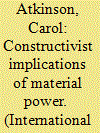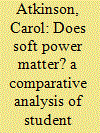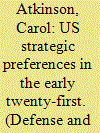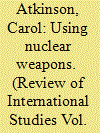| Srl | Item |
| 1 |
ID:
073546


|
|
|
|
|
| Publication |
2006.
|
| Summary/Abstract |
The research presented in this article examines one aspect of state socialization, the extent to which transnational military-to-military interactions have served as an effective mechanism of the democratic political socialization of states. Military organizations are very interesting when we consider avenues by which state socialization might occur because military organizations are an influential part of governments, and members share common beliefs and values as soldiers and officers that transcend borders. Thus, it would seem that a state's military structure is one likely channel whereby politically relevant individuals might learn new ideas and have the capability to reform existing institutional structures. The socialization process described in this study is three level: (1) individuals acquire new ideas; (2) coercion, incentives, and persuasion aid in institutionalizing these ideas in the underlying political structure of the state; and (3) once institutionalized, these new ideas/identity of the state influence the material and ideational structure of international society. Using Cox Proportional Hazard models and an original data set encompassing over 160 states during the years 1972-2000, the analyses find U.S. military-to-military contacts to be positively and systematically associated with liberalizing trends. This finding provides evidence that constructivist mechanisms do have observable effects, and that ideationally based processes play an important role in U.S. national security.
|
|
|
|
|
|
|
|
|
|
|
|
|
|
|
|
| 2 |
ID:
095586


|
|
|
|
|
| Publication |
2010.
|
| Summary/Abstract |
Democratic governance depends not only on the building of democratic institutions but also on citizens' knowledge about how these institutions should function in their everyday lives. I argue that US-hosted educational exchange programs are one mechanism whereby citizens of nondemocratic states might experience life firsthand in a democratic country. Their experiences may impact the political institutions and influence political behavior in their home countries. In order for this process to take place, I argue that at least three contextual conditions are important: (i) the depth and extent of social interactions that occur while abroad, (ii) the sharing of a sense of community or common identity between participants and their hosts, and (iii) the attainment of a politically influential position by the exchange participant when they return home. In this article, I test these hypotheses and find support for what advocates of soft power often contend: US-hosted exchange programs can play an important role in the diffusion of liberal values and practices across the borders of authoritarian states.
|
|
|
|
|
|
|
|
|
|
|
|
|
|
|
|
| 3 |
ID:
137937


|
|
|
|
|
| Summary/Abstract |
This article investigates how US national security planners have envisioned the emerging strategic environment during the early twenty-first century and evaluates how their perceptions of this strategic environment have changed during these years. This conceptual evolution can be seen in how defense planners define threats, identify defense priorities, and design security strategies. Five key strategic planning documents serve as the basis for this analysis and illustrate significant shifts in how the US government has envisioned its own security requirements as well as the context within which its strategic vision will need to be realized. These planning documents are: (1) Joint Vision 2020, (2) the Bush Administration’s 2002 National Security Strategy of the United States, (3) the Obama Administration’s 2010 National Security Strategy, (4) US Strategic Defense Guidance entitled Sustaining US Global Leadership: Priorities for 21st Century Defense, and (5) the US Chairman of the Joint Chiefs of Staff’s Capstone Concept for Joint Operations: Joint Force 2020.
|
|
|
|
|
|
|
|
|
|
|
|
|
|
|
|
| 4 |
ID:
100465


|
|
|